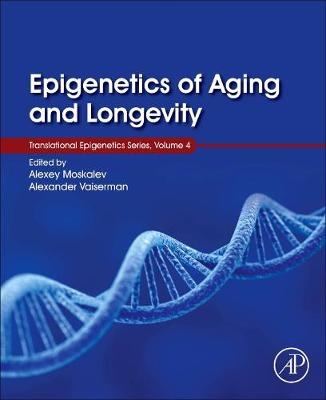
Epigenetics of Aging and Longevity
Academic Press Inc (Verlag)
978-0-12-811060-7 (ISBN)
This book will help researchers in genomic medicine, epigenetics, and biogerontology better understand the epigenetic determinants of aging and longevity, and ultimately aid in developing therapeutics to extend the human life-span and treat age-related disease.
Dr. Alexey Moskalev earned his PhD from Moscow State University, Moscow, Russia in 2001. Since that time, Dr. Moskalev’s research has focused on the genetics of longevity and aging, with emphasis on epigenetic regulation of aging, longevity, and stress resistance in animal models. He was a key contributor towards creating a database of biomarkers of aging in the Digital Ageing Atlas (DAA), and his lab has been supported by grants from the Russian Basic Research Foundation, the Presidium of the Russian Academy of Sciences, and the President of the Russian Federation through a program that funds leading young scientists. Currently, Dr. Moskalev is Vice-President of the Syktyvkar Branch of Russian Gerontology Society; President of the Komi branch of the Vavilov Society of Geneticists and Breeders; and a member of the editorial boards of Aging, Biogerontology, Frontiers in Genetics of Aging, Aging and Disease, Genes & Cells, and the SM Journal of Food and Nutritional Disorders. Additionally, he is Co-chair of the International Symposiums “Genetics of Aging and Longevity and “Biomedical Innovation For Healthy Longevity. Dr. Moskalev has published more than eighty scientific papers in peer reviewed journals on topics related to the genetics of aging and longevity, as well as DNR repair and defense genes in animal models. Dr. Vaiserman is head of the Laboratory of Epigenetics at the Institute of Gerontology, where his research has focused on long-term health consequences of adverse conditions in early life, genetic and epigenetic mechanisms of age-associated diseases, telomere length in patients with age-related chronic diseases, and molecular mechanisms mediating lifespan in Drosophila. He earned his PhD from the Institute of Gerontology, Kiev, Ukraine in 2004. During the last 7 years, Dr. Vaiserman was Project Leader for several Ukrainian government sponsored research projects. Dr. Vaiserman is also a member of the editorial boards of the journals Biogerontology, Frontiers in Genetics of Aging, and Gerontology & Geriatric Research. To-date, he has published four book chapters, as well as 65 papers in peer reviewed journals.
Section I: Epigenetic Mechanisms in Aging 1. Aging epigenetics: changes and challenges 2. Defective DNA methylation/demethylation processes define aging-dependent methylation patterns 3. S-adenosylmethionine Metabolism and Aging 4. The Epigenetic Clock and Ageing 5. The Epigenetic Regulation of Telomere Maintenance in Aging 6. Living Long and Ageing Well: Are Lifestyle factors the Epigenetic link in the Longevity Phenotype? 7. Epigenetic Biomarkers for Biological Age 8. The Role of Non-Coding RNAs in Genome Stability and Aging 9. Intra-tissue DNA methylation heterogeneity in aging
Section II. Early-life Epigenetic Programming of Aging Trajectories 10. Early Life Nutrition, Epigenetics and Altered Energy Balance Later in Life 11. Early Nutrition, Epigenetics and Human Health 12. Biological Embedding of Psychosocial Stress over the Life Course 13. Epigenetics of longevity in social insects
Section III. Epigenetics of Aging-Associated Diseases 14. Drosophila melanogaster as a Model for Studying the Epigenetic Basis of Aging 15. Histone modification changes during aging: Cause or Consequence? - What we have learned about epigenetic regulation of aging from model organisms 16. Epigenetics of brain/cognitive aging 17. The role of epigenetic modifications in cardiometabolic diseases 18. Epigenetic mechanisms in osteoporosis 19. Epigenetics of Skeletal Muscle Aging
Section IV. Epigenome-targeted Therapies in Gerocscience 20. Healthy Aging and Epigenetic Drugs for Diabetes and Obesity: A Novel Perspective 21. Epigenetic Drugs for Cancer and Precision Medicine 22. Epigenetic Drug Discovery for Alzheimer’s Disease
Section V. Conclusions and Perspectives 23. Epigenetics of aging and longevity: challenges and future directions
| Erscheinungsdatum | 25.11.2017 |
|---|---|
| Reihe/Serie | Translational Epigenetics |
| Verlagsort | San Diego |
| Sprache | englisch |
| Maße | 191 x 235 mm |
| Gewicht | 1310 g |
| Themenwelt | Medizin / Pharmazie ► Medizinische Fachgebiete |
| Studium ► 2. Studienabschnitt (Klinik) ► Humangenetik | |
| Naturwissenschaften ► Biologie ► Genetik / Molekularbiologie | |
| Naturwissenschaften ► Biologie ► Zellbiologie | |
| ISBN-10 | 0-12-811060-0 / 0128110600 |
| ISBN-13 | 978-0-12-811060-7 / 9780128110607 |
| Zustand | Neuware |
| Informationen gemäß Produktsicherheitsverordnung (GPSR) | |
| Haben Sie eine Frage zum Produkt? |
aus dem Bereich


